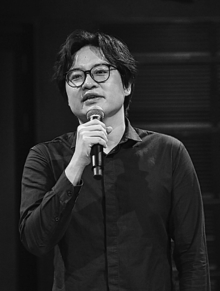Throwing themselves into their acting work
Part of a creative-support program for young directors, new play sees performers blend their own personality with that of their characters, Cheng Yuezhu reports.

Luo Fuxing says he is probably one of the most unlikely people to feature in a play associated with the classic Chinese novel The Water Margin, since he has never been to the theater, or even read the original book.
He was one of the trendsetters on the Chinese internet in the 2000s, and has since labeled himself "the godfather of shamate". The term was coined from his own transliteration of "smart", a subculture phenomenon known best by the striking appearances of its followers, adopted mainly by young factory workers as a way of self-expression.
Director Zhuang Yi, however, saw similarities between him and the character Shi Jin from the book, and cast him as a protagonist of a theatrical adaptation of the novel, All Men Are Brothers, which recently premiered in Beijing at the Pioneer Theater of the National Theater of China.
On the stage, Luo took up the role of Shi, but also told his own life stories, proudly bringing the iconic elements of shamate, including the colorful spiky hairdos and some distinctive dance moves.
Just like Shi who, in the story, refuses to take over the family tradition of farming to pursue his passion for martial arts, Luo was dissatisfied with working on the assembly line and decided to broadcast his own identity with an extravagant makeover.
With this unconventional format, Zhuang wants the audience to feel that the lives of these ancient characters are not much different from the lives of their own, rather than think that they are just watching a classic literary work being performed onstage for the umpteenth time.
"Instead of a purely fictional play, I wanted to present authenticity. So I tried something interesting, with the actors jumping in and out between the characters they are playing and themselves, acting out historical stories while telling those of their own," Zhuang says.
This play marked the premiere of the National Theater of China's creative-support program for young directors, where 12 young directors are invited to bring 12 plays adapted from classic pieces of Chinese literature.
Zhuang says that he had always been interested in making a stage rendition of The Water Margin: "This novel is outside the orthodox, the commonly accepted aesthetics. It embodies a sort of rank-and-file, even marginalized vitality, growing like wild grass, not restricted by any convention."
As the book itself is an epic novel with its iconic "108 heroes", Zhuang chose to delve in from the universal theme of friendship, with implications in both ancient and contemporary times.
The title All Men Are Brothers comes from American writer Pearl S. Buck's translation of the novel, which to Zhuang best manifests the core message he would like to convey.
He then chose the character Lu Zhishen, whose friendship with Shi Jin and Lin Chong, to him, is the most genuine and precious in the book. The stories he chose come from the first 10 chapters of the book, with focus on the early life experiences of the individual characters.
The character of Lin Chong, a disheartened martial arts coach of the imperial army, is performed by Luo Xi, an actor from Beijing People's Art Theater, who also tells of his own frustration and disappointment, and Lu Zhishen, a fervent defender of justice, is played by Pasai from comedy production company Mahua FunAge.
Despite the different backgrounds of the actors, both Zhuang and Luo Fuxing say that the cast has developed a camaraderie, with each member of the team working hard to ensure the smooth production of the play.
For Luo Fuxing, the lack of professional acting experience was offset by an "assembly line" approach to the show, comprising long hours and muscle memory. Zhuang says that Luo Fuxing was almost always the first one to arrive at the rehearsal room and the last one to leave, because they had additional one-on-one sessions at the end of the day.
Luo Fuxing says that he was simply being himself, even when acting as Shi Jin, but that was precisely the effect Zhuang wanted. The fluctuation between truth and fiction embodies, to him, the charm of theater.
Although most of the time the play went well, Luo Fuxing says that, during one performance, there was a point onstage when he made a couple of mistakes, and suddenly wanted to quit acting out of sheer irritation. However, upon hearing the lines of the other actors, he instinctively returned to the stage and continued acting.
"Theater is like an assembly line. I got back the factory worker's body I had abandoned for many years, and pieced together the worker's soul I had shattered. That moment, I believed in the power of theater," he says.
"I feel that I'm very lucky to have met the director and the actors. Although I didn't like theater, I got to know about these eccentric people. We really hit it off."
Zhuang expresses a similar view about the play allowing their life paths to cross and, after staging the play, he feels its title is incredibly apt.
He also says that he is thankful for this program, for giving him an incentive to make an adaptation he has always wanted to try, and for offering him the utmost support in staging a play that allows him to express himself.
This is the first season of the support program themed on classical Chinese literature. The young directors chose from The Water Margin and The Peony Pavilion and are bringing their own stage adaptations to the Pioneer Theater each weekend from July 31 to Sept 2.
According to the National Theater of China, the support program is a project rooted in Chinese culture that aims to establish a platform for young theater talent. The program has planned its first three seasons, with the second and the third set to focus on global classics and original Chinese stories, respectively.
Apart from providing the directors with the opportunity, the theater also invited veteran stage artists to design two stage sets with traditional Chinese elements, as well as lighting directors to work with the teams.
The program is set to become a recurring project for the theater, which will assist all kinds of young theater talent, with support programs for playwrights and actors to come in the near future.
"To have cultural confidence, we need to first get to know and understand our own culture. This is why the first season of our support program begins by exploring classical Chinese literature," Tian Qinxin, head of the National Theater of China, said at the premiere.
"The 12 young directors take the audience on this journey of developing cultural awareness, with the aim of achieving creative transformation and development."


Today's Top News
- Xi's book on governance hailed for insights into 'China miracle'
- European destinations swamped by tourists
- Economy expected to maintain steady pace
- Stable, healthy Sino-US ties benefit all
- CPC plenum to focus on next five-year plan
- Talks highlight the fact that cooperation benefits both sides, confrontation harms both






























